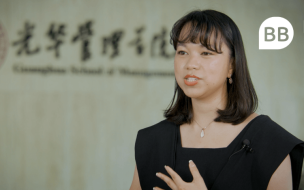This fast-growing industry is creating ample opportunities for ambitious professionals, but in this competitive landscape, standing out to employers can be tricky.
Studying an MBA can help you do just that, building the network, knowledge, and hands-on experience it takes to find a role in this exciting area.
That’s exactly what Gaby Pan experienced after her MBA. Through the MBA at Peking University’s Guanghua School of Management, Gaby pivoted from auditing to a career with the wireless tech producer Qualcomm, working in the company's investment arm.
Here’s how the MBA supported her career transformation.
Building a Chinese network
An MBA had been in the cards for some time when Gaby (pictured below) enrolled at Guanghua. She began her career with EY, working as a manager in transaction advisory. 
“It was a great place to get a solid set of financial skills, practice multitasking, and learn to work under pressure—but I wanted to go further in my career,” she explains.
An MBA presented the ideal opportunity to broaden her network, and pivot into her dream career as a primary market investor.
When it came to choosing a program, Gaby had no doubts that she wanted to study at Peking University’s Guanghua School of Management in Beijing.
“It’s my dream university,” she reflects. “The school offers Chinese expertise, and is famous for its finance and investment courses.”
This expertise pays off for students who want to build a career in China after graduation. Over half of MBA graduates stay and work in the country after their program.
Because of its extensive alumni network, Guanghua has connections at over 600 companies, and the careers team often puts students in touch with alumni in their target sector.
Lifelong industry connections led to Qualcomm
The connections Gaby made at Guanghua played a significant role in helping her break into her current role with Qualcomm Ventures.
The alumni mentor program at Guanghua offered a particularly useful connection. The program introduces current students to successful alumni working in their area of interest, who can offer tips and insights.
“I chose a mentor in the primary investment market, who had established his own venture capital fund,” Gaby explains.
“By communicating with him, I learned about early-stage companies and developed an understanding of how investment managers handle potential investment targets.”
The MBA also introduced Gaby to China’s tech ecosystem. Her peers had experience in a broad array of sectors, and she was able to learn about different trends and innovations across industries.
“Through the MBA, I got to know people from diverse sectors. Today, these connections are a quick way for me to get information on different industries—especially those where I want to invest,” Gaby explains.
Hands-on experience in China
Getting hands-on experience was another highlight of the MBA for Gaby. Through the integrated practical project (IPP), she worked with a small group of her peers to put together a proposal for Panasonic on how to enter China’s retail industry.
“What I learned from that experience was how to cooperate with teammates who have different backgrounds and working styles,” she reflects.
Alongside her studies, Gaby also had the chance to complete a six month private equity internship with the China International Capital Corporation (CICC).
"I think the PKU MBA degree helped me get the position as CICC really values the education background of its candidates," she says.
The experience helped familiarize her with the investment landscape, which proved crucial when it came to finding a post-MBA job.
Both experiences brought home the importance of communication skills for a career in investing, Gaby notes.
“The experience helped me learn what it takes to be an excellent investor: good communication skills, curiosity, and asking the important questions,” she says.
Launching a career with Qualcomm
Today, Gaby is among the 21.8% of Guanghua MBA graduates who enter the tech industry.
Gaby’s department at Qualcomm focuses on early stage companies that relate to telecommunications, such as 5G, the internet of things (IoT), AI and the automotive industry.
As a ventures manager associate, she researches startups for potential investments, interviews their founders, and analyzes their business models—as well as staying abreast of how portfolio companies are performing.
“Qualcomm was looking for an expert in valuation modeling, who was good at project management and interested in venture capital investment,” she recalls.
The application process was challenging, Gaby says, but the practical experience she built at Guanghua helped her stand out to her interviewers.
“That experience helped me learn how the investment landscape works, and what it takes to be an excellent investor, such as strong communication skills, and curiosity,” she concludes.
* Main image © Nathan Rupert, used under this license
Student Reviews
Peking University Guanghua








